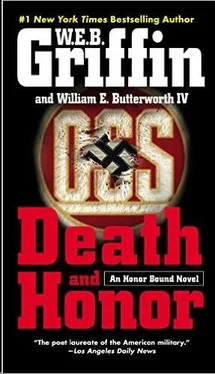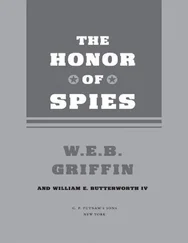Griffin W.E.B. - Honor Bound 04 - Death and Honor
Здесь есть возможность читать онлайн «Griffin W.E.B. - Honor Bound 04 - Death and Honor» весь текст электронной книги совершенно бесплатно (целиком полную версию без сокращений). В некоторых случаях можно слушать аудио, скачать через торрент в формате fb2 и присутствует краткое содержание. Год выпуска: 2009, Издательство: Penguin USA, Inc., Жанр: Старинная литература, на английском языке. Описание произведения, (предисловие) а так же отзывы посетителей доступны на портале библиотеки ЛибКат.
- Название:Honor Bound 04 - Death and Honor
- Автор:
- Издательство:Penguin USA, Inc.
- Жанр:
- Год:2009
- ISBN:нет данных
- Рейтинг книги:4 / 5. Голосов: 1
-
Избранное:Добавить в избранное
- Отзывы:
-
Ваша оценка:
- 80
- 1
- 2
- 3
- 4
- 5
Honor Bound 04 - Death and Honor: краткое содержание, описание и аннотация
Предлагаем к чтению аннотацию, описание, краткое содержание или предисловие (зависит от того, что написал сам автор книги «Honor Bound 04 - Death and Honor»). Если вы не нашли необходимую информацию о книге — напишите в комментариях, мы постараемся отыскать её.
Honor Bound 04 - Death and Honor — читать онлайн бесплатно полную книгу (весь текст) целиком
Ниже представлен текст книги, разбитый по страницам. Система сохранения места последней прочитанной страницы, позволяет с удобством читать онлайн бесплатно книгу «Honor Bound 04 - Death and Honor», без необходимости каждый раз заново искать на чём Вы остановились. Поставьте закладку, и сможете в любой момент перейти на страницу, на которой закончили чтение.
Интервал:
Закладка:
“In German?” Boltitz blurted.
“Good ol’ Carlos speaks German, but thinks I don’t know,” Frade said.
He walked to the study door, unlocked its dead bolt, and held it open.
Von Wachtstein offered him his hand as he walked past.
“Keep your goddamn mouth shut, Peter,” Frade said, but he took the hand and touched von Wachtstein’s shoulder affectionately.
Boltitz offered Frade his hand.
Frade took it, and held on to it longer than Boltitz expected. When he looked curiously at Frade, Frade said, “Am I going to have to count my fingers when I let go, Captain?”
“No,” Boltitz said. “But I think you will anyway.”
Frade nodded at him. There was the hint of a smile on his lips.
Both men had just about the same thought: Under other circumstances, we probably would become friends.
After his wife passed through the door, Frade threw the dead bolt again.
He went to the desk, took a sheet of paper, and rolled it into the Underwood.
He patted his hands together for a moment, mentally composing the message, and then typed it rapidly.
URGENT
TOP SECRET LINDBERGH
DUPLICATION FORBIDDEN
FROM TEX
TO AGGIE
IN POSSESSION OF NEW INFORMATION REGARDING GALAHAD CONNECTIONS. I AM UNWILLING TO TRANSMIT EXCEPT PERSONALLY TO YOU. SITUATION HERE PRECLUDES MY LEAVING HERE. ACKNOWLEDGE. ADVISE.
TEX
Aggie was United States Marine Corps Reserve Colonel A. F. Graham, deputy director of the Office of Strategic Services for Western Hemisphere Operations. Like Marine Corps Major Cletus H. Frade, Graham was a former member of the Corps of Cadets at the Texas Agricultural and Mechanical College at College Station, Texas, and thus an Aggie.
When he finished typing, Frade went to the door, unbolted and opened it, and handed the sheet of paper to Enrico, who was sitting in an armchair with his Remington in his lap.
“Take this out to El Jefe right away,” Frade ordered. “Tell him to encrypt it and get it out as soon as possible.”
El Jefe—“the chief ”—was Chief Radioman Oscar J. Schultz, USN, who had been drafted into the OSS off the destroyer USS Alfred Thomas, DD-107, when she had called at Buenos Aires three months before. Schultz had been her chief radioman and cryptographer. He now operated a radio and radar station in a clump of trees on the monte of Estancia San Pedro y San Pablo several miles from the main house.
“I will send Rodrigo,” Enrico protested.
“You will take it,” Frade said firmly, and then smiled. “I won’t leave the house, Enrico. I promise. I give you my word of honor as an officer and gentleman, and you know how important that is to me.”
The sarcasm went over Enrico’s head.
“I will send Rodrigo here, then I will go,” he said. And then he asked a question. “Am I going to be permitted to kill the other young German bastard?”
“Not just yet,” Frade said.
II
[ONE]
The Reich Chancellery Berlin, Germany 1230 23 June 1943
Parteileiter Martin Bormann—a short, stocky forty-three-year-old who wore his hair closely cropped—pulled open the left of the huge double doors to his private office and smiled apologetically at the waiting Vizeadmiral Wilhelm Canaris, who was short, trim, and fifty-five years old.
Compared to just about everybody else in the senior hierarchy of Nazi Germany but the Führer himself, both men were simply uniformed. Bormann was wearing a brown shirt and trousers, and he had on shoes rather than boots. His right sleeve bore a red Hakenkruez armband with the black swastika in the center of a white circle. Canaris was wearing a naval uniform, but without the flag officer’s silver belt to which he was entitled, and which almost every other admiral wore. Neither was either man wearing a holstered pistol, another item of fashion among most senior officers.
“I’m really sorry to have kept you waiting, Canaris, but you know how it gets in here sometimes,” Bormann greeted the vizeadmiral.
“It’s not a problem, Herr Reichsleiter,” Canaris replied.
He thought: I knew very well that you would keep me waiting. Not to do so would have been an admission that you were not working your fingers to the bone for the party. It is important to you that you appear important. That’s why I called you “Herr Reichsleiter.”
Bormann’s official title—he was second only to Hitler himself in the Nazi party—was Parteileiter, “party leader.” But on several occasions Hitler had referred to him as “Reichsleiter”—a leader of the Reich. Canaris was convinced Hitler had simply misspoke, but the sycophants around Hitler, who were convinced the Führer never made a mistake, had begun to call Bormann “Reichsleiter” and Bormann liked it.
“I’ll try to make amends with a good lunch,” Bormann said, waving Canaris into his office. “With your permission, of course, I thought we would eat here. Just the two of us. That way we won’t be interrupted.”
“That sounds wonderful. But I can’t believe we won’t be interrupted.”
“Trust me, we won’t be,” Bormann said.
Bormann took his arm and led him through another set of enormous doors into his private dining room, where a table large enough for twenty had two place settings on it.
A pair of waiters in white jackets, nice-looking young men in their late teens or early twenties, stood ready to serve them.
They were interns, Canaris knew, “studying the operations” of the Nationalsozialistische Deutsche Arbeiterpartei so that they would be able to later assume roles of responsibility in the Thousand-Year Reich. This was important enough for them to be given “temporary” exemption from military service.
There were more than two dozen of them working for Bormann. Every one of them, Canaris knew, was either the son or the nephew of a high-ranking Nazi Party official.
Which is corrupt and immoral, Canaris thought.
He believed that sort of favoritism was the basic flaw in the Nazi party and its leadership.
The SS, especially, is riddled through with thieves and sociopaths.
“May I offer you a glass of wine, Canaris? Or champagne, perhaps?” Bormann asked as he sat down and gestured for Canaris to take the chair at the side of the table.
“Thank you, no, Herr Reichsleiter. If there is any, I’ll have a glass of beer.”
Bormann snapped his fingers and one of the interns hurried to produce a bottle of beer, the proper glass for it, and to set it before Canaris.
Bormann lifted the silver covers on the plates on the tables, and nodded approvingly at what they had been keeping warm.
“That will be all, thank you,” he said to the waiters. “The admiral and I will serve ourselves.”
Both young men clicked their heels, bowed crisply, and walked out of the dining room, closing the door after themselves.
Canaris wondered if Bormann had his wire recorder running and was recording this meeting. It was an idle thought, as Canaris always acted as if he knew whatever he was saying was being recorded, and said nothing that could possibly be used against him.
Wordlessly, the two served themselves. First, a consommé, then roast pork with mashed potatoes, green beans, applesauce, and red sauerkraut.
“Very nice,” Canaris said.
“Truth to tell, Canaris,” Bormann said. “I suspected getting people out of the office and my desk clear was going to take more time than I would have liked, and that I would be forced to ask you to wait. So a special lunch was in order, by way of apology. And if I proved to be wrong, and I could have received you on time, you would have been impressed by both my efficiency and the lunch.”
Canaris smiled and chuckled dutifully.
Читать дальшеИнтервал:
Закладка:
Похожие книги на «Honor Bound 04 - Death and Honor»
Представляем Вашему вниманию похожие книги на «Honor Bound 04 - Death and Honor» списком для выбора. Мы отобрали схожую по названию и смыслу литературу в надежде предоставить читателям больше вариантов отыскать новые, интересные, ещё непрочитанные произведения.
Обсуждение, отзывы о книге «Honor Bound 04 - Death and Honor» и просто собственные мнения читателей. Оставьте ваши комментарии, напишите, что Вы думаете о произведении, его смысле или главных героях. Укажите что конкретно понравилось, а что нет, и почему Вы так считаете.












